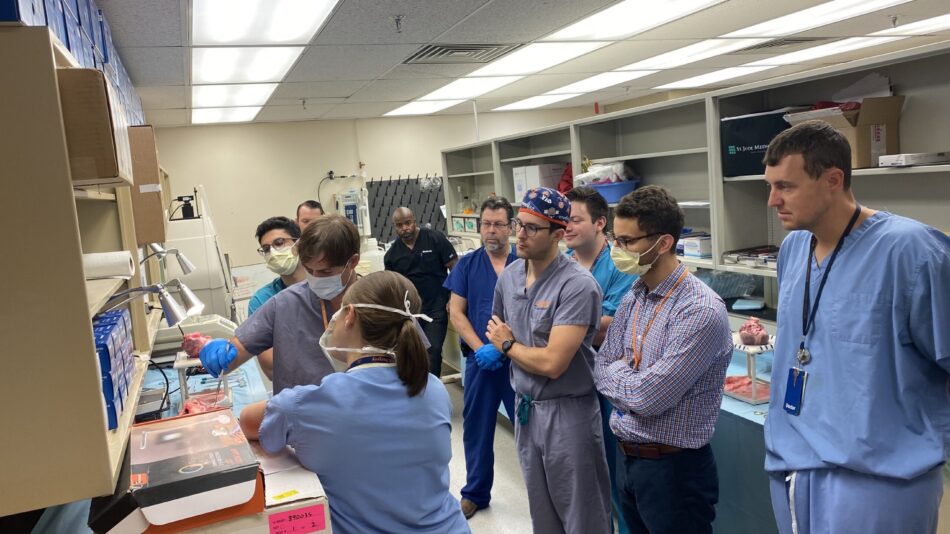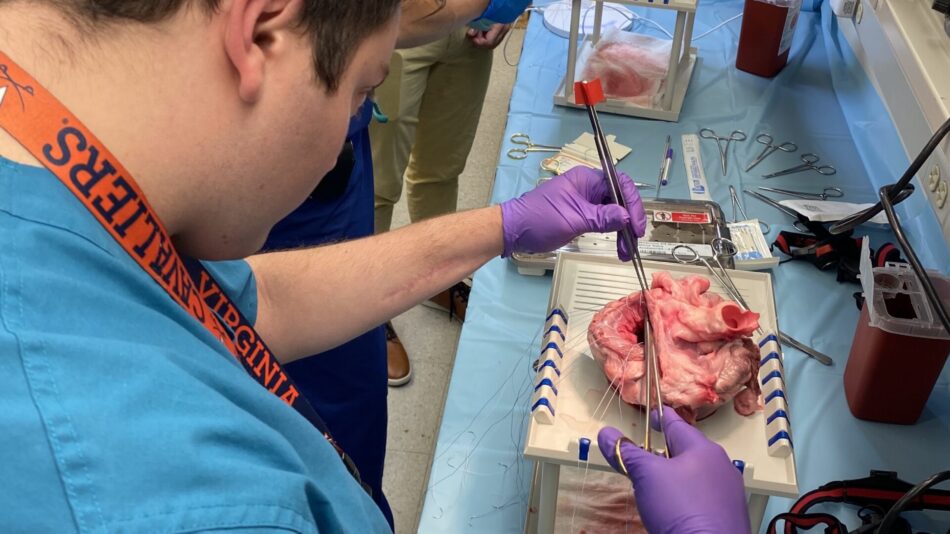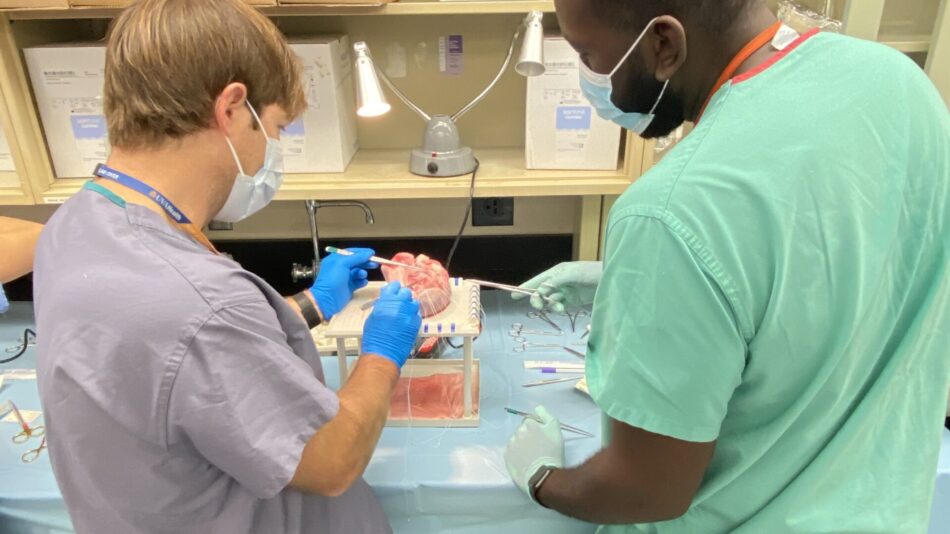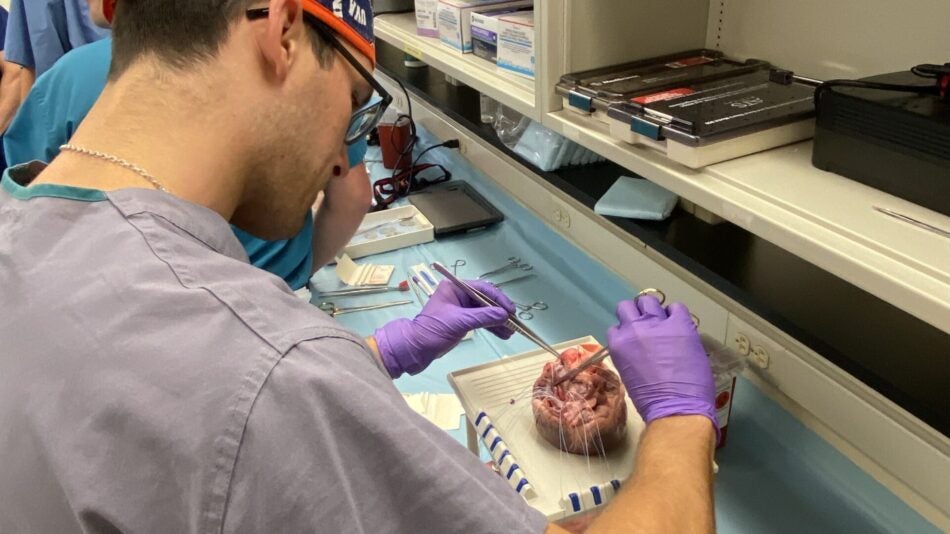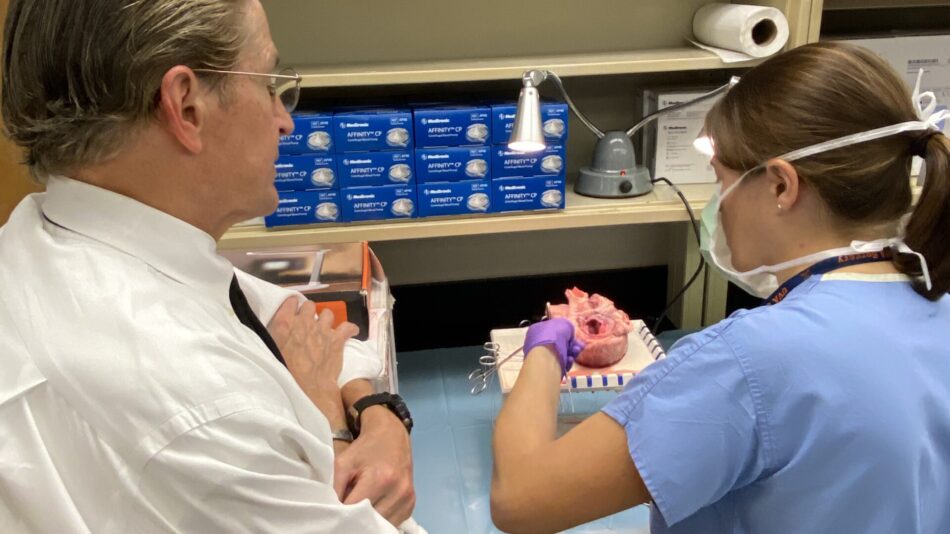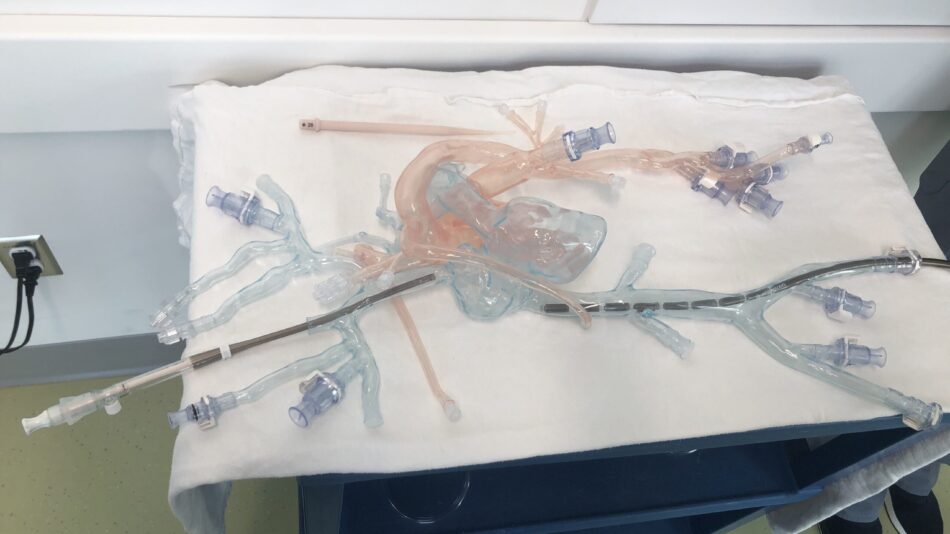Thoracic Educational Program
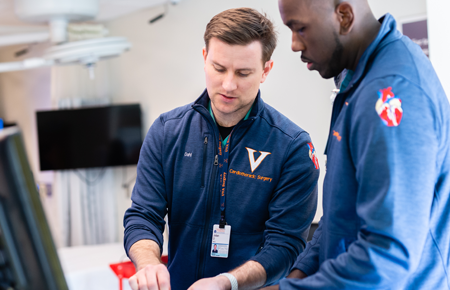
The primary goal of the Thoracic Surgery Residency at the University of Virginia is to educate and train the next generation of cardiothoracic surgeons. Our residents have been chosen from amongst the most accomplished candidates. In order to achieve our educational goals our primary focus is on the operative experience of the residents, allowing autonomy for them as they gain experience in the preoperative, perioperative, and postoperative care of their cardiothoracic surgical patients.
Thoracic Surgery Curriculum
Design of the Two Year Program
Rotations for the residents are outlined as noted in the chart below with exceptions made occasionally depending on the service needs of the program and the educational needs of the individual residents. In general, the senior CT residents will spend 18 months on adult and pediatric cardiac surgery and 6 months on general thoracic surgery. The GTS track residents will spend 14 months on general thoracic surgery and 10 months on adult and pediatric cardiac surgery. The clinical PGY5 and PGY6 years of the I-6 program mirror the two years of the Traditional (Independent) program.
Sample Traditional (Independent) Thoracic Surgery Rotation Schedule
 Text Description of Sample Traditional (Independent) Thoracic Surgery Rotation Schedule
Text Description of Sample Traditional (Independent) Thoracic Surgery Rotation Schedule
Case Variety
The case variety and clinical experience at the University is extraordinarily varied and robust. All residents will perform, with appropriate supervision, minimally-invasive valve surgery, off-pump coronary bypass procedures, complex aortic surgeries, redo cardiac procedures, aortic endograft procedures, transcatheter valve replacements, minimally-invasive atrial fibrillation ablative procedures, and LVAD and cardiac transplantation procedures. The Thoracic Surgery Residency experience includes VATS lobectomies and segmentectomies, all types of esophagectomies, laparoscopic benign esophageal disease procedures, extrapleural pneumonectomies, surgery for mediastinal tumors, lung transplantation, and lung volume reduction surgeries.
Conferences and Clinics
Through participation in regular interdisciplinary clinical conferences, our residents are exposed to a wide variety of perspectives regarding the treatment of cardiovascular and thoracic conditions. Some conferences are also held in conjunction with General Surgery, and special joint conferences are conducted with disciplines including Radiology and Adult and Pediatric Cardiology. Our resident and faculty-led conferences follow the Thoracic Surgery Directors Association’s (TSDA) comprehensive didactic curriculum over the two year period of the residency.
The faculty surgeons provide clinical correlations and assist the residents in understanding the current literature in our discipline. The residents present topics for discussion at clinical case conferences, multi-disciplinary conferences, and at local and national cardiothoracic society meetings. Each cardiothoracic surgery resident will also attend one national scientific conference each year and will occasionally be able to attend regional conferences or educational courses annually.
It is the goal of the UVA Thoracic Surgery faculty to teach by example, and through daily contact, demonstrate at all times the highest levels of integrity, professionalism and dedication to those entrusted to their care.
Sample Conference Schedule
| Monday | Tuesday | Wednesday | Thursday | Friday |
|---|---|---|---|---|
| Cardiac Conference 6:30 - 7:00am | Heart Failure Conference 7:00 - 7:30am | Cardiothoracic M&M 7:00 - 8:00am | Thoracic Conference 7:00 - 7:30am | Cath Conference 7:00 - 7:30am |
| Advanced Valve Conference 7:30 - 8:00am |
Text Description of Sample Conference Schedule
Research Opportunities
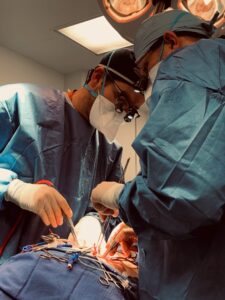 While the length of the Traditional Thoracic Residency is two years and the majority of that time is spent in clinical care and operating, residents are encouraged to participate in clinical research during the residency program. There is no time in the final two years for basic research as part of the curriculum. However, the Thoracic Surgery faculty members are actively involved in a variety of clinical research studies which provide residents opportunities to participate in this type of research. The average number of publications from the Thoracic Surgery faculty is approximately 60-75 annually. There is ample opportunity for resident participation in manuscript and book chapter publications for peer-reviewed journals and texts.
While the length of the Traditional Thoracic Residency is two years and the majority of that time is spent in clinical care and operating, residents are encouraged to participate in clinical research during the residency program. There is no time in the final two years for basic research as part of the curriculum. However, the Thoracic Surgery faculty members are actively involved in a variety of clinical research studies which provide residents opportunities to participate in this type of research. The average number of publications from the Thoracic Surgery faculty is approximately 60-75 annually. There is ample opportunity for resident participation in manuscript and book chapter publications for peer-reviewed journals and texts.
Simulation
The UVA faculty recognizes the value of simulation. Monthly labs have been developed for residents to receive additional training using inanimate models. Training sessions include such techniques as mechanical circulatory support, mitral valve repair, coronary artery anastomoses, and valve sparing root procedures. While the majority of surgical technical education still occurs in the operating room, we recognize that simulation can provide a low stress environment in which rare or complex procedures can be fully demonstrated and practiced.
Application Info
Applications to our program are accepted through Electronic Residency Application Service (ERAS AAMC).

